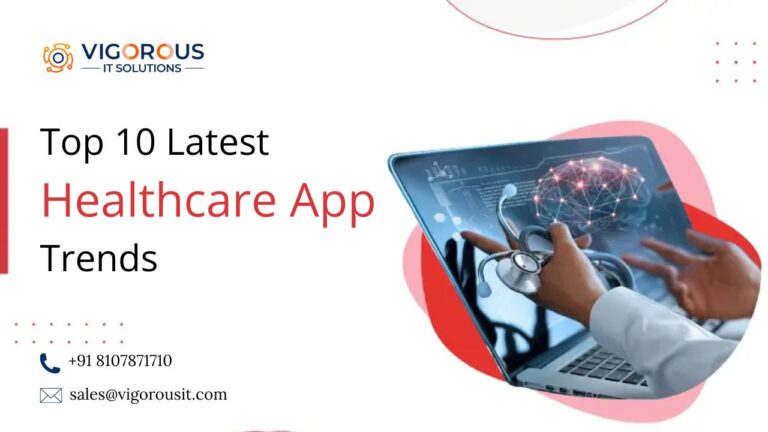The online healthcare industry is on the rise as we approach 2024.
Multi-platform mHealth apps number over 350,000. Reports predict a CAGR of 11.6% between 2023 and 2030 for the global health app market.
Online healthcare is growing rapidly, but why is this so? What has driven patients to adopt mHealth apps? The rise of healthcare apps is the absolute answer.
To offer personalized medical services to patients, healthcare apps use various technologies such as big data, AI and ML, IoT, and blockchain. The quality of healthcare services is being enhanced by these technologies.
You’ll learn about the latest trends in healthcare app development in this blog!
Top 5 Latest Healthcare App Trends
Over the last decade, there has been a significant increase in technological evolution. This has led to the unparalleled development of healthcare solutions that were not seen in the past.
Here are 10 healthcare app development trends that are revolutionizing the online healthcare market.
1. Rise of Telehealth & Telemedicine
The World Health Organization (WHO) defines telemedicine as ‘healing from a distance’. Patients with chronic diseases and mobility issues benefit from the rise of telehealth and telemedicine. Telemedicine is at the top of our list of healthcare mobile app trends. In lieu of in-person consultations, patients can now consult doctors online via video consultation platforms.
Both medical professionals and patients have benefited from this convenience. In addition, it allows patients to schedule consulting sessions regularly without having to miss any due to commuting concerns. Through telemedicine and telehealth services, patients have access to medical practitioners across the globe. Doctors can be chosen based on their preferred locations and specializations.
2. Wearables Go Mainstream (IoMT)
Wearable technology has revolutionized healthcare in the 21st century. Modern wearable medical devices provide remote patient monitoring (RPM) thanks to advances in biosensor technology. Fitness and health management are two primary uses of medical wearable devices. The devices measure blood pressure, pulse, and heart rate.
With wearables, doctors can keep an eye on chronic disease patients and patients with mobility issues remotely. The doctor can monitor the patient’s symptoms, especially in cases such as cancer, and alert him or her to take action early. Healthcare wearables include glucose meters, blood pressure monitors, fitness trackers, ECG monitors, and activewear.
3. Blockchain in Healthcare
Healthcare institutions would be quick to say that their biggest concern is managing their electronic medical records effectively. Data exchanged between hospitals, pharmacies, and diagnostic laboratories must be secure. The data must be protected from misuse by notorious third parties at all costs.
With blockchain technology, medical data sharing becomes transparent. Integrating blockchain technology with mobile healthcare applications prevents data manipulation. Every data record is maintained on the decentralized ledger, helping avoid data duplication & discrepancies.
4. AR/VR in Healthcare
A top trend in medical app development is using AR/VR. Mental illnesses such as stress & depression can be treated with virtual reality healthcare applications. Through VR settings, they can travel to ideal virtual locations such as a nature park or mountain range. With the help of virtual instructors, they can practice guided meditation & mindfulness exercises.
Meanwhile, surgeons & medical practitioners use AR to prepare for surgery. Virtual bodies are presented in 3D along with seismic vibrations, allowing doctors to perform precisely modeled surgeries on them.
5. Personalized Mental Health Apps
Healthcare apps like Headspace, Calm, Moodfit, and others are revolutionizing the wellness industry! With their personalized mood stabilization programs and exercises, these mental health apps generate great revenue. Why is that? One in four US adults suffers from a diagnosable mental disorder.
With more and more individuals experiencing stress, worry, and despair, there is a significant market for mental health applications. In 2023, you can gain a lot as a startup owner by releasing a mental health app that assists users in overcoming their inner demons. You can offer alternatives for video tutorials to help people recover from particular mental illnesses as well as live treatment sessions with reputable experts.
Read Also: Guide To Healthcare App Development
Impact of Mobile Apps on the Healthcare Industry
In today’s fast-paced world, people do not find time for their health. Because of their busy schedules, they fail to take care of themselves, have healthy meals, and exercise for fitness. mHealth applications evolved from this need of the hour.
Globally, healthcare organizations have turned their attention to developing healthcare apps since COVID-19 was released. Mobile healthcare services and innovative apps have increased substantially since the pandemic.
Technology advancements such as AI & ML, IoT, VR, blockchain, big data, cloud computing, and wearable healthcare devices have supplemented the increased adoption of mHealth apps. Mobile apps are having a ‘whirlwind impact’ on healthcare.
Mobile healthcare applications have revolutionized the way doctors and patients connect through virtual consultations and telemedicine. It allows doctors to establish a great level of intimacy with their patients and attend to their medical needs on time thanks to remote patient monitoring.
The impact is only going to grow in the coming future!
Develop Your Own Healthcare App Today!
Get Free Consultation
+91 8107871710
Embrace healthcare app trends with Vigorous IT Solutions
Are you interested in creating a world-class healthcare application that reflects the latest trends in healthcare? With vigorous IT, you can launch your custom healthcare app in no time. Vigorous IT Solutions is a leading healthcare app development company that develops patient-centric healthcare apps.
Our app developers are experts in implementing and developing medical apps that suit your healthcare business model. We can build a robust mHealth app based on your requirements. Also, you can get technical expertise, budget estimations, and project implementation ideas.
You can hire healthcare app developers from us and work with our team when it is convenient for you. Their flexibility allows them to work different shifts and contributes significantly to the completion of your project. What do you think?

